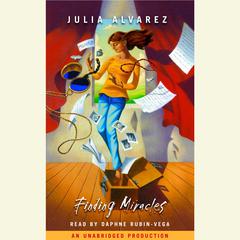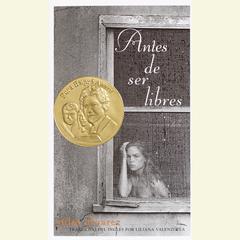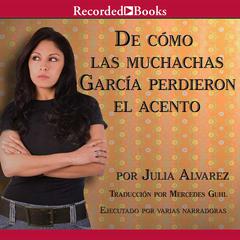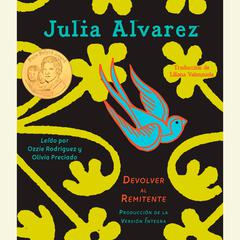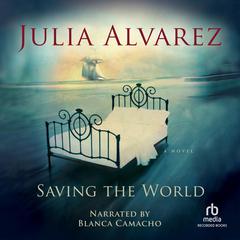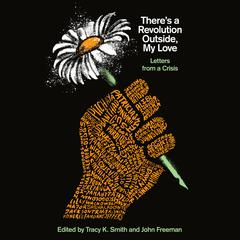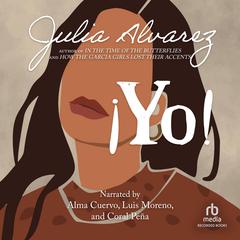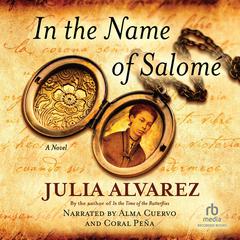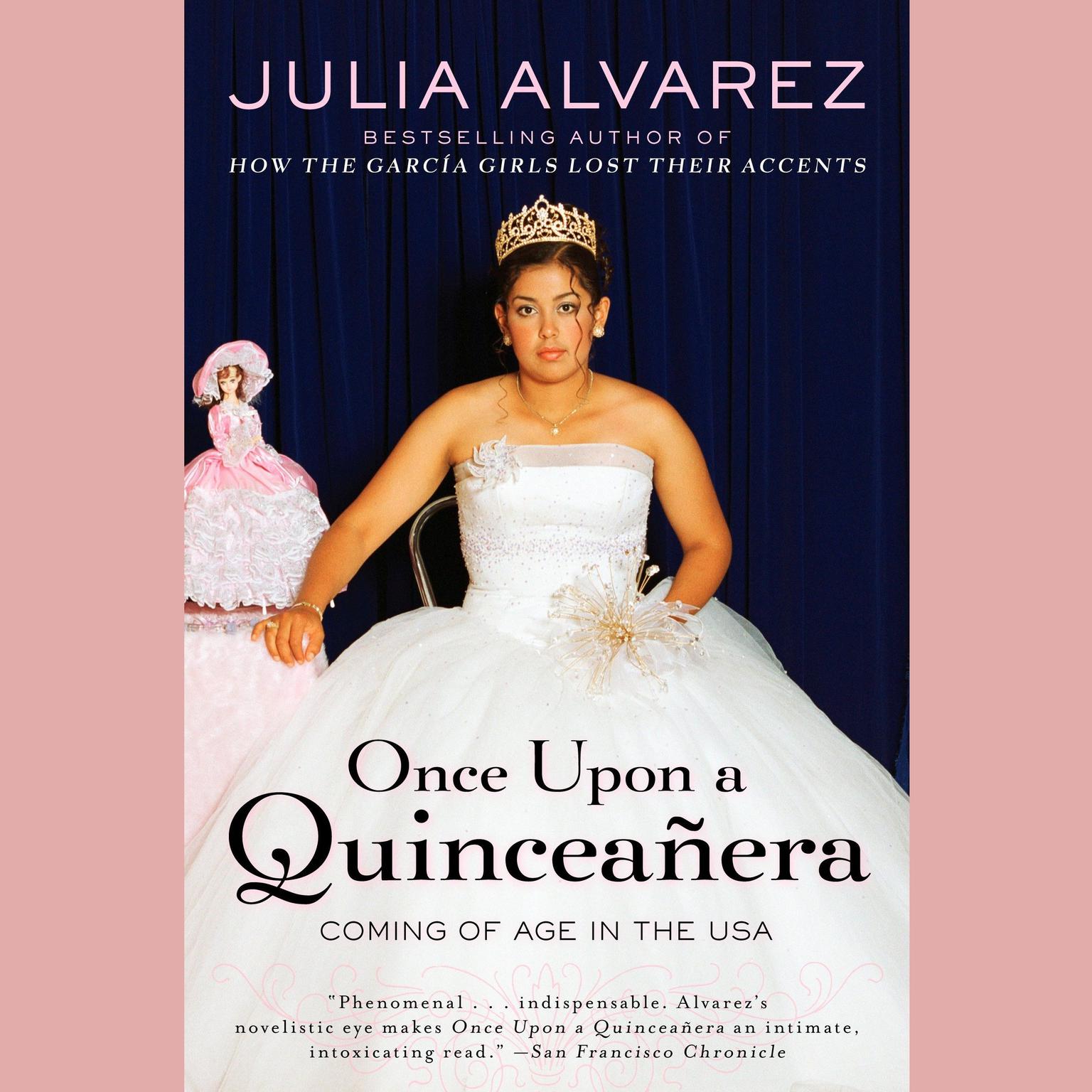 Play Audiobook Sample
Play Audiobook Sample
Once Upon a Quinceanera: Coming of Age in the USA Audiobook
 Play Audiobook Sample
Play Audiobook Sample
Quick Stats About this Audiobook
Total Audiobook Chapters:
Longest Chapter Length:
Shortest Chapter Length:
Average Chapter Length:
Audiobooks by this Author:
Publisher Description
The bestselling author of How the Garcia Girls Lost Their Accents, Julia Alvarez, examines the parties and preparations of the quincea–era.
Download and start listening now!
"I think this a wonderfully informative and entertaining book about one of the many "coming of age" traditions. Alvarez writes insightfully and compassionately about the different Hispanic communities and raises many questions about how this particular tradition sometimes expresses itself in the U.S.and in the Latin American countries today."
— Ashwinee (4 out of 5 stars)
Awards
-
A 2007 National Book Critics Circle Award
Once Upon a Quinceanera Listener Reviews
-
" Interesting exploration of what quinces have become in America. "
— AudryT, 2/10/2014 -
" I have several students already planning for their own Quinceaneras, so this was a very interesting glimpse into that culture. Some girls spend more on their Quinceaneras than I spent on my wedding! A very readable, well-researched book. "
— Megan, 2/8/2014 -
" So, far this is a very interesting glimpse into a Latin American "tradition" exploited by the dream of becoming American, while preserving ones culture. "
— Julie, 1/31/2014 -
" A fascinating blend of sociological observation and historical-literary research. The immense significance and beauty and ethical concerns over waste surrounding this tradition. "
— Julie, 1/27/2014 -
" This book had a number of good reviews, and I can see why. It was an interesting glimpse into the culture of the quinceanera (the elaborate celebration of a girl's 15th or 16th birthday in Latina culture), which I certainly would not have otherwise had. I very much liked the profile style of writing, that following one particular family's celebration while working in newsy explanations of each aspect. I was not as fond of her choice to weave her own personal reflections about her own life, as they were only slightly relevant and I was more interested in the analysis of the quinceanera. "
— Susan, 12/24/2013 -
" After hearing Julia Alvarez speak this summer at Middlebury, I was eager to read this book. It provided an interesting look into this one event within Latino culture in America and also had thoughtful commentary of youth culture in the US in general. "
— Mercedes, 12/22/2013 -
" What I love about Alvarez' writing is that she's always informative, but warm -- you feel like you really want to sit down and have a glass of red wine with her while you solve the problems of the world. This one is a work of nonfiction, but still in her warm style. "
— Suzanne, 12/21/2013 -
" I love this author, and as usual, her writing style really appeals to me. Interesting topic, but seems better suited to a pamphlet instead of a full book. Maybe I'm just not the target audience for it? "
— Julie, 12/13/2013 -
" Julia Alvarez' book Saving the World prompted me to read more by this author. But this story did not draw me in. Somehow, the connection to the featured girls seemed more observed than linked. In the end I did not finish the book. "
— Susan, 11/20/2013 -
" DDC 395.23 Subjects: Hispanic American social life customs; rites; ceremonies. "
— Marcia, 10/3/2013 -
" Interesting topic and great prose about her own life, but the book wasn't cohesive. It seemed to need another round of editing. "
— Karen, 8/29/2013 -
" An interesting blend of social commentary, new journalism, and autobiography. "
— Belén, 8/12/2013 -
" THis is an interesting read so far. Nothing to keep you gripping the pages but I like how the author explores this tradition in hispanic culture. I never gave it too much thought and didn't realize how supersized it had become in the good ol' USA. "
— Mary, 6/4/2013 -
" An interesting book about quinceaneras and how they have been shaped and changed by being celebrated in America. "
— Jennie, 11/28/2012 -
" Perfect example of readable, interesting nonfiction. Well written, interesting questions presented in a forthright manner. "
— Maris, 8/21/2012 -
" The beginning of this book was really interesting. I really enjoyed Alvarez's descriptions of the Quince's she attended, and I learned a lot about Latina culture. But there was a little too much Alvarez in the book. Had I wanted to read a biography of Alvarez, that's what I would have looked for. "
— Colleen, 6/21/2012 -
" As a Latina reading this book is kind of weird because the shared experiences are common sense to me. however, I can see how someone of outside the culture would probably find this book interesting. "
— Cece, 11/13/2010 -
" I couldn't stick with it before the lib wanted it back. "
— Claire, 10/14/2010 -
" I didn't enjoy it as much as I'd hoped. "
— Liz, 8/19/2010 -
" A magazine article masquerading as a book. Reads like an editor's assignment, which it was. "
— Sarah, 6/10/2010 -
" As a Latina reading this book is kind of weird because the shared experiences are common sense to me. however, I can see how someone of outside the culture would probably find this book interesting. "
— Cece, 4/25/2010 -
" A great look at the must-have, over-the-top, materialistic event that has become out of a rite of passage: the quinceanera. A lot can be said of what the modern wedding has become as well and Alvarez makes great insights on this event's emerging new meaning (which might not be that great of one). "
— Erin, 4/3/2010 -
" Interesting exploration of what quinces have become in America. "
— AudryT, 3/10/2010 -
" The first half of this book is more of a journalistic view of Quincineara's and the history of this tradition. The second half focuses more on Alvarez's life and her struggle to form her own identity as a Dominican American woman and independent, career focused woman. <br/> <br/> "
— Heidi, 1/24/2010 -
" Interesting topic and great prose about her own life, but the book wasn't cohesive. It seemed to need another round of editing. "
— Karen, 1/22/2010 -
" Perfect example of readable, interesting nonfiction. Well written, interesting questions presented in a forthright manner. "
— Maris, 10/26/2009
About Julia Alvarez
Julia Alvarez grew up in the Dominican Republic before immigrating to the United States at the age of ten. She now lives in Vermont, where she is a writer-in-residence at Middlebury College, Vermont.
Julia Álvarez vivió su infancia en República Dominicana hasta 1960, cuando emigró a los Estados Unidos. Luego de obtener sus títulos de pregrado y postgrado en literatura y creación literaria, enseñó poesía durante muchos años y publicó su primer libro de poemas, Homecoming, en 1984. Ha recibido becas del Fondo Nacional para las Artes y de la Fundación Ingram Merrill. De cómo las muchachas García perdieron el acento recibió el premio PEN Oakland/Josephine Miles en 1991, que se entrega a obras que presentan un punto de vista multicultural. En la actualidad, enseña literatura inglesa en Middlebury College.





